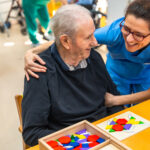Dementia can be a devastating condition and, in the later stages, can mean that a person needs support and care as they become unable to look after themselves. If your parent, partner, or close friend is diagnosed with dementia, you’ll likely want to do all you can to help them, but due to the complexity of the condition, it can be difficult to know how to do this, especially as the disease progresses.
At Dementech Neurosciences, we provide leading care, treatment, and support to people with dementia and their loved ones. We understand how overwhelming and tricky it can be to navigate living with dementia, and that’s why we’ve put together this guide on how to help someone with dementia. The more you understand the condition and the support services that are available, the better you can care for both you and your loved one, too.
If someone you’re close to has just been diagnosed with dementia, be it Alzheimer’s, vascular dementia, or another type of dementia, read on as we explain more about the process of helping someone with this condition.
Relationships, roles and responsibilities
The first thing to note is that dementia can impact a person’s personality, how they view themselves, and how they view others. In the early stages, it’s likely that these changes may be less severe, but for the person with dementia, they may be frustrated with their symptoms and their inability to do things they used to do. This can lead to them feeling embarrassed or ashamed of their symptoms and them wanting to withdraw from their social circles and isolate themselves, especially if they feel like they have no emotional support.
As the condition progresses, behavioural changes can occur, such as agitation, aggressiveness, repetitive behaviour, loss of inhibition, or sundowning. These changes may make it difficult for people around them to know how to deal with them, and for the patient themself to continue with their daily activities, such as working or socialising. This can be more of an issue in the case of young onset dementia where the person develops dementia before the age of 65.
With these factors in mind, a dementia diagnosis often brings about a change in relationships, roles and responsibilities. Your relationship with your loved one might change. For example, if the person with dementia is your parent and they’ve always been there to support you and look after you, this dynamic might shift and invert, seeing you become the person who is there for them and who looks after them. If possible, you might take on caring duties and a host of new responsibilities that come with it, or you might become involved in coordinating third-party dementia care for your family member.
You might also need to explain to other family members and those around them that your loved one has dementia and therefore isn’t necessarily in control of what they say, do or think. You can provide help on how best to interact with them, ensuring the person with dementia doesn’t become isolated entirely.
Responses to dementia
A diagnosis of dementia is a big thing for anyone to try and absorb and come to terms with. It can be incredibly distressing and hard to cope with, especially for the patient in the early stages. It’s natural that a person with a dementia diagnosis might feel scared, anxious, unsure, overwhelmed, worried, agitated, or even in denial about their condition.
Dementia affects everyone differently, and the different types of dementia can have an impact of their own, too, but by and large, many people with dementia feel as though they will lose their sense of identity. This can be crushing to come to terms with, especially if they start to get treated differently in the early stages.
As the condition progresses, out of character behavioural changes can occur that can be distressing for the person with dementia, as well as those around them. One person with dementia may become subdued and withdrawn, but another person might shout and scream a lot. There’s no real way to know how a person’s behaviour might change as a result of dementia, but understanding why a person might be behaving the way they are is integral to knowing how to help them.
Many behaviours are fear responses or general frustration about the situation. Particularly in the early stages, it’s important to be mindful of the emotions a person with dementia might be feeling, and educating yourself on how dementia affects the brain and how it progresses can be of huge help in the later stages.
3 ways to help someone living with dementia
Living with dementia is challenging, as is being a caregiver to a person with dementia. It can be stressful and difficult for both parties, especially as more noticeable symptoms start to appear. With this in mind, here are three small ways you can help a person with dementia.
1. Change your communication
It can be difficult for people with dementia to communicate like they used to. They might forget words or phrases, or struggle to follow conversations, even if there are minimal or no distractions. What’s more, some people with dementia experience anxiety and might interpret body language or facial expressions differently. All of these factors can make communication difficult, but there are ways you can try and adapt.
Firstly, speak at a slower pace, make sure your speech is clear and audible, and use simpler and shorter words and sentences. If you’re asking them questions, closed questions may be better, or giving them multiple answer options. Making sure you don’t move suddenly and avoiding tense facial expressions can go a long way to making the person with dementia feel safe, as can maintaining your distance so they don’t feel intimidated.
You can also look to make eye contact with your loved one to ensure they’re focused and concentrating on you. Don’t talk over them or on their behalf, and make an effort to ensure they’re always included in conversations. Above all, make sure you listen. Whether they communicate with you via speech, facial expressions, movements, or gestures, be patient and try to listen carefully to what they’re telling you, and make sure you don’t rush them to answer.
2. Support independence
One of the hardest things for people with dementia to come to terms with is an eventual loss of independence. If you start treating your loved one as if they’re incapable of doing things themselves, especially in the early stages where they might be able to do things but it could just take a little longer, they might feel undignified or ashamed. They might even feel frustrated.
Rather than taking over, take things day by day and support their independence for as long as possible. Do tasks together and offer reassurance and support. Try not to dwell on what they can’t do – highlight and celebrate what they can do. If the person prefers, break down tasks into smaller sections and take things slowly. These small changes make dementia patients feel like they’re still independent, and this can go a long way to boosting their mood and general wellbeing.
3. Engage in activities
A dementia diagnosis doesn’t mean an automatic halt to doing new things or being socially active. There are lots of things people with dementia can do, including socialising with other dementia patients at a dementia cafe or coffee morning, doing art activities, sharing stories and reminiscing, or getting active through dementia-specific gym, swim, or walking sessions.
Dementia is incredibly common which means there are lots of specialist activities and hubs across communities. Age UK is a great resource for finding dementia social activities and local services near you.
How can I support someone as their dementia progresses?
There is no cure for dementia and the rate at which a person progresses through the various stages will change from person to person, but one of the key aspects of supporting someone with dementia is understanding what to expect. You might find it useful to ask doctors and specialists about how the condition will progress and do some external research to gain a better understanding.
Generally speaking, more care will be required as dementia worsens, so you may want to discuss what steps to take with your loved one in the early diagnosis stages whilst they have an active voice and can still make informed decisions for themselves. Thinking about finances, who will provide continuous care, and whether or not a care home will be required are all things to think about as the condition progresses.
What support is available for me if I care for someone with dementia?
Caring for someone with dementia isn’t easy, especially in the later stages. It can take a toll on your mental and physical wellbeing. It’s important that you look after yourself and don’t neglect your own needs and health. If you’re struggling, you could look into counselling and talking therapies. You can also join support groups and speak to other carers who are going through the same thing.
Alternatively, you might find it useful to engage in periods of respite and have someone else take over caring duties for a short time whilst you recharge and take a break. If you’re not feeling your best, you won’t be able to provide the right level of support and help to your loved one, so make sure you’re your own priority.
If you’re caring for someone with dementia, the team at Dementech Neurosciences can offer support and advice if you’re struggling.
FAQs about caring for someone with dementia
How can I help someone with dementia remember things?
Dementia can cause memory issues and this can be frustrating for everyone involved. To help, you might encourage your loved one to make use of to-do lists, diaries, journals, or speech recorders so they have a reference to go back to. Memory aids around the home, such as labels, can also help.
When should someone with dementia go into a care home?
As dementia progresses, more care will be required, and you might be wondering if a care home might be necessary. In the early stages when they had the mental capacity to make their own decisions, they may have spoken to you about this and voiced whether or not they want to go into care. If they didn’t, you may need to consider whether you can provide the level of care that is needed to keep your loved one safe. If you have safety concerns or aren’t able to offer the level of help that is needed, getting professional carers in or looking at care homes is a good idea.
How can I help someone with early dementia?
In the early stages of dementia, remember to keep your behaviour and interactions the same. Make provisions where necessary, such as by including memory aids and adjusting your communication, but allow the person with dementia to retain their independence and do what they can. Don’t assume for them and don’t minimise them to their diagnosis.
Dementia support and treatment at Dementech Neurosciences
If your loved one has been diagnosed with dementia and you need advice on caring for and helping them, please contact us to learn more about the private dementia treatment and support we offer. Alternatively, book an appointment today.





